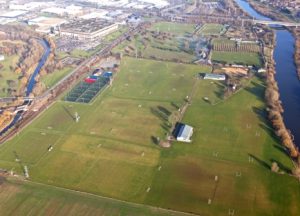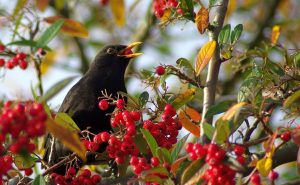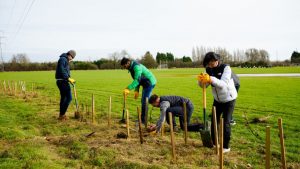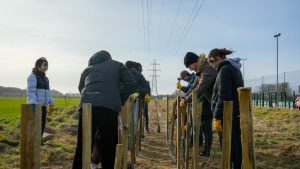
February 12, 2024, by sustainablenottingham
Creating a wildlife-friendly habitat at Riverside
A new hedgerow, full of wildlife-friendly plants and trees, is being planted on university land by students and staff. The hedgerow will create additional wild space and ‘green corridors’ along the River Trent, at the edge of some of Nottingham’s large industrial areas.

Riverside Sports Complex
In December 2022 the university’s sports teams collaborated with the grounds team and sustainability team to begin planting a species-rich hedgerow at Riverside Sports Complex They planted over 850 native trees and whips to offset the emissions generated by teams travelling to a sporting event held at the university (BUCS Big Wednesday). This was planted with the help of student volunteers from the university’s sports teams and the Student Sustainability Society.
The habitat grows
Building upon this fantastic initiative, we are expanding this habitat over the next two years with additional support from Severn Trent Water’s (STW) Biodiversity Boost fund. Our goal is to plant a total of around 4,400 trees and whips to create a 3km long species-rich hedgerow.
In January 2024, students from across UoN came together with the grounds team to plant over 650 trees and whips in 3 hours.
Why plant a hedge?

Hedges are the most widespread semi-natural habitat in the UK, they support a large diversity of flora and fauna. Planting hedgerows is as important as planting trees for tackling the climate and nature crisis. They are a valuable refuge and food source for wildlife and provide a green corridor of connected habitats.
Species being planted include: hawthorn, holly, field maple, crab apple, rowan and dog rose. Wildflower seed is being sown nearby to create further foraging for insects and animals.

This project will also enable the area and sport facilities – which are enjoyed by so many – to better adapt to the realities of a changing climate. As well as visitors to the sports complex, nearby riverside public footpaths means that the university community and local residents will also benefit from the increased natural habitats.
The university has pledged to become a Nature Positive University as part of the UN Environment Programme . This means we are committing to Reducing negative impacts on nature, Restoring species and habitats and Renewing ecosystems. The project will link to other biodiversity and nature improvements at UoN and also link to those along the River Trent in Nottingham. Find out more.
Get involved
There will be further planting events in the Autumn and into 2025. Whilst it’s a long way away, you can register now if you’re interested in taking part or joining other similar conservation activities across our campuses.

No comments yet, fill out a comment to be the first

Leave a Reply